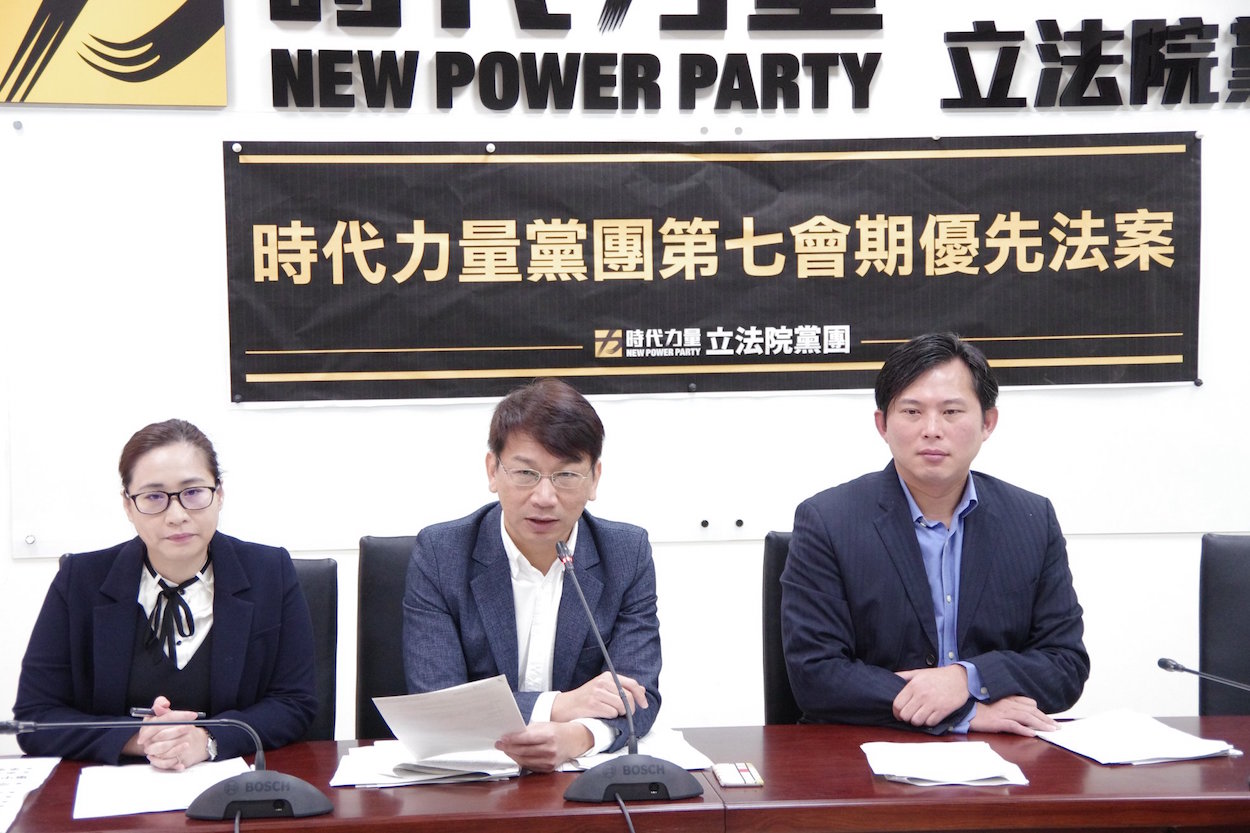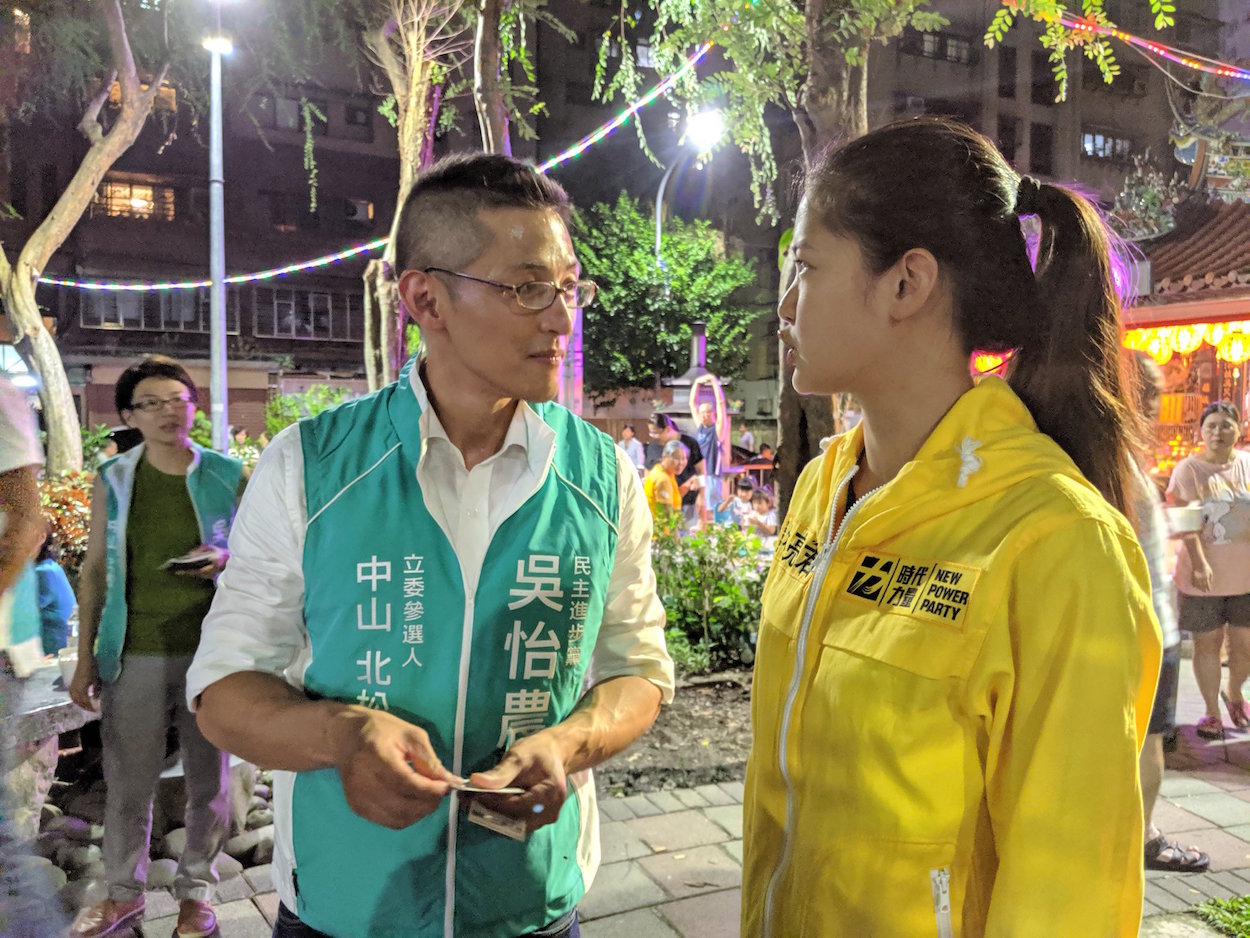by Brian Hioe
語言:
English
Photo Credit: 時代力量宜蘭黨部/Facebook
THE INTERNAL CRISIS of the NPP continues, with elements of the party leadership seemingly still uncommitted to endorsing Tsai Ing-wen of the DPP in 2020 presidential elections and continuing to flirt with the idea of nominating former chair Huang Kuo-chang as the NPP’s presidential candidate.
The NPP’s central standing committee announced that it was considering running Huang on September 10th, with the claim that this was discussed at a committee meeting that day. This claim was immediately disputed by NPP central committee members including Taipei city councilor Sabrina Lim and chief technology officer Hsiao Hsin-cheng, who claimed that no such discussion had taken place.
 The NPP’s 2019 general congress. Photo credit: 時代力量/Facebook
The NPP’s 2019 general congress. Photo credit: 時代力量/Facebook
The implication, then, as stated by Hsiao, would be that the other members of the central standing committee violated the party’s internal democracy and commitment to transparency in attempting to make such an announcement on misleading premises. Fellow central committee member and NPP think tank worker Lee Bo-yi later explicitly stated his opposition to the NPP running a candidate in 2020 presidential elections, something which Hsiao echoed.
The notion of running Huang or any other individual as a presidential candidate for the NPP in 2020 presidential election has been strongly opposed by younger members of the NPP, primarily individuals in their 20s and 30s such as Lim, Hsiao, and Lee.
It is feared that running a presidential candidate could potentially be splitting of the vote in such a manner as to allow for a KMT victory in what is already projected to be a tight race, particularly in consideration of the possible entrance of Terry Gou, Ko Wen-je, and Wang Jinpyng into the race as part of a three-way political alliance. Younger members of the party likely also fear that running a presidential candidate with no real chances of electoral success would put the NPP on the path to becoming an ideologically-driven third party with few genuine chances of growth.
However, older members of the party seem more set in their opposition to the NPP backing a DPP candidate. Hence the notion of running Huang for president.
Nevertheless, Huang effectively has no chances of victory. It is even a question as to whether Huang will stay with the NPP or intends to leave the party. Huang has already announced that he does not intend to seek reelection as legislator of New Taipei District 12, something that prompted controversy within the party, although it is possible that Huang deciding not to run for reelection in New Taipei District 12 is an attempt at angling for a spot on the NPP’s party list. Huang has also been accused of planning to leave the NPP to join with live streaming personality Holger Chen to form a new political party.
The NPP’s ongoing internal crisis regarding the issue of whether to endorse Tsai Ing-wen or not already led to the withdrawal of Freddy Lim and Hung Tzu-yung, two of its five legislators, and the resignation of party chair Handy Chiu. This took place in the same timeframe as a conflict of interest scandal which led to legislator Kawlo Iyun losing her seat as legislator.
 NPP chair Hsu Yung-ming (center) and former chair Huang Kuo-chang (right). Photo credit: 時代力量/Facebook
NPP chair Hsu Yung-ming (center) and former chair Huang Kuo-chang (right). Photo credit: 時代力量/Facebook
After Lim and Hung left the party and Chiu resigned, the party originally seemed to have been pushed toward endorsing Tsai by their actions. As it was younger members of the NPP, such as former city councilor candidate Wu Cheng, who first forced the issue of the party’s stance on Tsai to begin with and called for the party to endorse Tsai, this led city councilor Sabrina Lim, 29, to announce her candidacy for chair of the party. The choice of the NPP’s party chair is voted upon by the party’s fifteen-member central standing committee and the party chair has to be a member of the central standing committee.
Lim taking up chair of the party would have likely been the best chance for the party to regain lost momentum, by suggesting that—despite the party having lost three of its five legislators, primarily individuals in their forties—that it would now reorient toward its younger, up-and-coming members—that is, its sixteen city councilors, primarily individuals in their twenties and thirties. But Lim did not win in her bid for party chair, with legislator Hsu Yung-ming instead proving victorious. Hsu, the oldest of the NPP’s legislators at age 53, had previously advocated running Huang Kuo-chang as the NPP’s presidential candidate.
It seems that despite being branded as a post-Sunflower Movement “Third Force” party led by young people, the NPP is unable to overcome its generational inertia, internally. But one notes that in an unexpected reversal, it is now the DPP which has named a number of young people to high positions in office and which is running a number of young candidates for office in 2020.
The DPP has recruited former Sunflower Movement student leader Lin Fei-fan as deputy secretary-general of the party, as well as prominent youth activists such as Aman Wu to take up a post as head of the department of organization and Lu Jia-hua to take up a post as head of the newly-formed Policy Discussion Working Group. Furthermore, DPP is running a number of young candidates for legislature, including former party spokesperson Lii Wen, 30, think tank scholar Enoch Wu, 38, and former Sunflower Movement activist Lai Ping-yu, 28. One notes that the DPP is actually running young candidates for higher political positions than the NPP did.
Interestingly, Lai Ping-yu, who until recently worked in Freddy Lim’s office in the NPP, will be running against Lai Chia-lun, the director of Huang Kuo-chang’s office, in New Taipei District 12. Huang announced in August that Lai will be running in New Taipei District 12 in his stead, given Huang’s apparent disinterest in seeking reelection.
 Sabrina Lim of the NPP (right) and Enoch Wu of the DPP (left). Photo credit: 林亮君/Facebook
Sabrina Lim of the NPP (right) and Enoch Wu of the DPP (left). Photo credit: 林亮君/Facebook
Indeed, one notes that a number of the rising stars of the DPP are former Sunflower Movement activists, including city councilors Jiho Chang, Wu Pei-yi, and Huang Shou-da. Not all Sunflower Movement activists that became politicians after the movement joined Third Force parties, but a surprising number, in fact, joined the DPP. With the internal crises of the NPP seeming to have no resolution in sight, it is not impossible that a number of the party’s younger politicians will eventually bolt for the DPP, if they do not strike out as independents instead.
Third Force parties such as the NPP originally sought to define themselves as independent from both the KMT and DPP, with the view that both parties had proved equally corrupt during their years in power. Yet one generally suspects that with the beginnings of a clear generational change visible in the DPP, this may make Third Force politicians less resistant to joining the DPP going forward. It remains to be seen if this will be the case.

